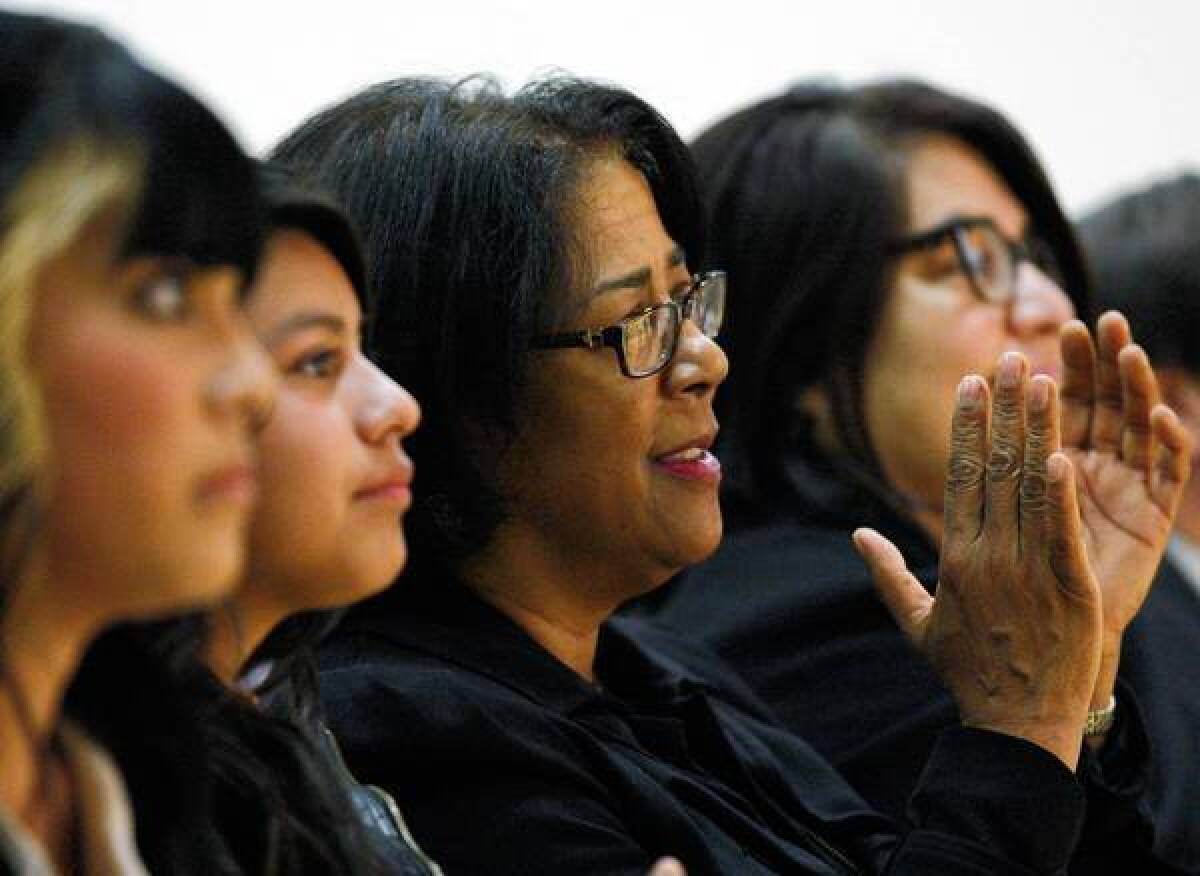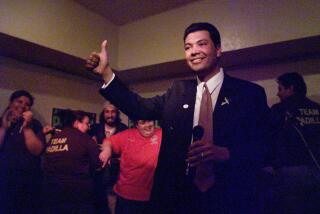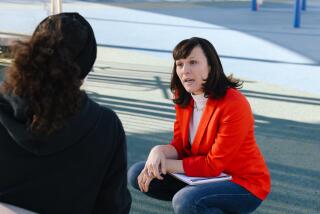Jan Perry in some ways a classic Angeleno

Second in a series of articles focusing on key periods in the lives of the mayoral hopefuls.
When Jan Perry came to Los Angeles as a college freshman to watch the Ohio State Buckeyes play in the 1974 Rose Bowl, she had no idea that a trip to a football game would change her life.
“All I remember is being shocked at how warm it was when I got here and the sky was blue and that people were wearing shorts,” Perry said, recalling walking down Hollywood Boulevard, visiting Olvera Street and seeing the Jackson Five in the Rose Parade. “I was struck by the diversity, just the mosaic of people.”
As soon as she went home to Ohio, she filled out a transfer application to USC, and enrolled her sophomore year.
L.A. ELECTIONS 2013: Sign up for our email newsletter
That was the beginning of a new chapter for Perry, now a veteran City County member running to become Los Angeles’ first African American woman to be elected mayor.
“I came here and I felt like I belonged,” she said recently over burgers at a downtown restaurant. “There was something about being here, I really felt like I could do whatever I wanted to do, and just walk through any door. I was just on a search for something. Fulfillment.”
Of the elected officials in the race, Perry, 57, is the only non-native Los Angeles resident.
FULL COVERAGE: L.A.’s race for mayor
She is known for being business-friendly, which has drawn critics who complain that she appeases powerful interests at the expense of constituents and city coffers.
She grew up in a suburb of Cleveland during racially tumultuous times, having a cross burned on her family’s lawn, but also seeing both of her parents elected mayor of their town.
In some ways, she is a classic Angeleno: an African American transplant from the snowy Midwest who converted to Judaism and speaks Spanish. She represents a district whose demographics are rapidly shifting from a stronghold of black voters to Latino.
Before Perry got into politics, she was a paralegal for 14 years and earned a master’s degree in public administration. While living in Mid-Wilshire on the Miracle Mile, she became active in neighborhood preservation. She instantly impressed Renee Weitzer, then a staffer for Councilman John Ferraro, with her ability to gauge the effects of proposed development on the neighborhood.
“She was very realistic. She wasn’t anti-development, she wasn’t pro-development,” Weitzer said. “She just had a knack for it.”
So Weitzer urged Perry to apply for a planning deputy job in then-Councilman Mike Woo’s office. Perry was a hard worker, balancing “angry homeowners and irritated real estate developers,” Woo recalled.
Perry later joined the staffs of council members Rita Walters and Nate Holden before running herself. She moved into the 9th District and, amid criticism that she was a carpetbagger, won the 2001 race to represent downtown and part of South L.A.
The district is a study in disparity — celebrities sit courtside at Lakers games at Staples Center, minutes from where the city’s most downtrodden residents sleep on skid row. The southern part, once the post-World War II home to middle-class African Americans, is one of the city’s poorest areas.
Perry has had to straddle these worlds, shepherding high-end development, such as downtown’s Ritz-Carlton hotel complex, while trying to create housing and jobs for the neediest.
Balancing the privileged and the poor has led to uncomfortable fights.
She and other city officials were viewed as villains when 350 families who grew food and flowers on the 14-acre South Central Farm were evicted in 2006.
The city had acquired the land by eminent domain in the 1980s but never used it, so the prior owner sued. The city sold it back to him in 2003 in a deal that called for him to donate 2.6 acres for a park. The council later scrapped that plan and instead had the landowner pay to improve nearby parks, clearing the way for the property’s sale to clothing manufacturers.
Perry said the plot, in an industrial area, was unsuitable for a park because of diesel emissions. Farmers and their supporters accused her of using the health-risk issue as a pretext to push through development. The clash was featured in “The Garden,” an Oscar-nominated 2008 documentary.
Perry counters that the farmers were pawns of activists, and that she worked alongside Mayor Antonio Villaraigosa to find nearby land for them to continue gardening.
Although he disagreed with Perry’s handling of the farm, Woo cites it as proof of her resilience.
“I would say her greatest single strength is she has very strong backbone,” he said.
Perry said her decision-making can be traced to a long-standing interest in development and planning.
“I always liked to design things, and I still do,” she said, noting that as a child, she built a backyard rock garden with three-foot boulders. “The truth of it is if you are willing to understand and work at the details, you can really change a neighborhood.”
This interest is evident in a tour of projects she has championed in her district. New housing for vulnerable populations — emancipated foster children, fixed-income seniors, poor families — is not sterile or institutional. The projects pay careful attention to design, such as artwork, sunny garden areas and landscaping that buffers street noise.
She also has pushed to place services near those who need them, from GED classes at foster-youth housing, to a Fresh & Easy grocery at an affordable housing complex — a coup because of the lack of supermarkets in South L.A., a longtime frustration of Perry’s.
The biggest knock on Perry’s candidacy is that when she pushes such deals, she is too cozy with developers, giving away too much in public goods while asking too little in return.
Perry claims credit for $15 billion in private investment in Los Angeles and 90,000 jobs, carrying the torch for high-profile developments stretching from L.A. Live to Bunker Hill, where she lives.
To seal two downtown hotel deals — the J.W. Marriott and the reconstruction of the landmark Wilshire Grand — Perry and her council colleagues granted subsidies allowing developers to keep up to $519 million in taxes generated by the properties over decades, money that might otherwise be spent on police, fire and other services.
Perry has defended such tax breaks, insisting that projects would not get done without them. But her critics contend that she has been far too eager to accommodate developers.
Madeline Janis, a labor advocate who spent 10 years on the Community Redevelopment Agency board, points to the development that included the Fresh & Easy as an example. The developer received a $2.5-million easement. Janis and two other CRA commissioners argued unsuccessfully that in exchange, the developer should have had to guarantee living-wage jobs, or that any retail tenant would have to sell healthy food.
“You’re representing the interests of the taxpayers and it’s OK to say, ‘We want these things and we’re going to negotiate them into the deal,” Janis said. As the British company that owns Fresh & Easy contemplates shuttering all of its U.S. stores, Janis worries that the lack of requirements in the easement agreement means there is no guarantee a grocery will replace it.
Perry dismisses such charges, noting that every project she has overseen has included a community-benefits component.
“My first concern has always been to put people back to work,” she said. Her campaign noted that in the property’s title, there is a covenant that requires the owner to lease the space to a national drug or grocery store, and that Fresh & Easy starts workers at $10 an hour, provides healthcare for employees who work at least 20 hours a week and held a job fair to hire locally.
Perry has also weathered controversies over her finances.
She and her ex-husband, attorney Douglas Galanter, racked up more than $580,000 in tax debts, according to liens filed from 1993 to 2008. The liens were issued after they failed to fully pay tax bills from 1989 to 2001, but all of Perry’s debt has been paid, records show.
Perry and Galanter twice filed for bankruptcy protection in the 1990s, once jointly and once in his name only, records show. In 2001 they were in default on the mortgage on a home and sold it at a loss. Five years later, Perry fell behind by three months on her condo mortgage, but later caught up.
In 2006, when The Times first reported on their financial woes, Perry and Galanter blamed them on problems with his legal practice. Perry on Monday had no further comment about the matter.
What has dogged her mayoral campaign, however, is her lack of name recognition outside her district.
“I would think that people respect me because they know that I’m a woman of substance and that I’m not just about being on TV, that I draw my power and my energy from them and that I feel a moral obligation to produce,” she said. “Not just talk, but produce.”
She is hindered by a lack of deep-pocketed allies. She has strained relations with labor, but despite her pro-development stance is not the favored candidate of business. But she remains confident and recalls her first council race, which no one thought she could win.
“I remembered who I was and I just talked to people,” Perry said.
And if she doesn’t win? Perry said she will continue her journey seeking fulfillment — by studying to become a rabbi.
More to Read
Start your day right
Sign up for Essential California for news, features and recommendations from the L.A. Times and beyond in your inbox six days a week.
You may occasionally receive promotional content from the Los Angeles Times.








